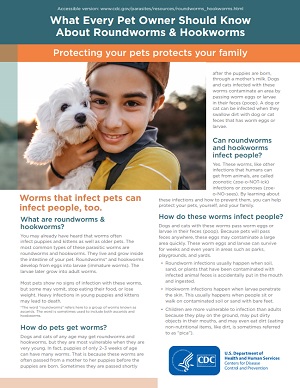What Every Pet Owner Should Know About Roundworms & Hookworms
Protecting Your Pets Protects Your Family
Worms that infect pets…
What are roundworms & hookworms?
You may already have heard that worms often infect puppies and kittens as well as older pets. The most common types of these parasitic worms are roundworms and hookworms. They live and grow inside the intestine of your pet. Roundworms* and hookworms develop from eggs into larvae (immature worms). The larvae later grow into adult worms.
Most pets show no signs of infection with these worms, but some may vomit, stop eating their food, or lose weight. Heavy infections in young puppies and kittens may lead to death.
* The word “roundworms” refers here to a group of worms known as ascarids. The word is sometimes used to include both ascarids and hookworms.
How do pets get worms?
Dogs and cats of any age may get roundworms and hookworms, but they are most vulnerable when they are very young. In fact, puppies of only 2–3 weeks of age can have many worms. That is because these worms are often passed from a mother to her puppies before the puppies are born. Sometimes they are passed shortly after the puppies are born, through a mother’s milk. Dogs and cats infected with these worms contaminate an area by passing worm eggs or larvae in their feces (poop). A dog or cat can be infected when they swallow dirt with dog or cat feces that has worm eggs or larvae.
…can infect people, too.
Can roundworms and hookworms infect people?
Yes. These worms, like other infections that humans can get from animals, are called zoonotic (zoe-o-NOT-ick) infections or zoonoses (zoe-o-NO-sees). By learning about these infections and how to prevent them, you can help protect your pets, yourself, and your family.
How do these worms infect people?
Dogs and cats with these worms pass worm eggs or larvae in their feces (poop). Because pets will pass feces anywhere, these eggs may contaminate a large area quickly. These worm eggs and larvae can survive for weeks and even years in areas such as parks, playgrounds, and yards.
- Roundworm infections usually happen when soil, sand, or plants that have been contaminated with infected animal feces are accidentally put in the mouth and ingested.
- Hookworm infections happen when larvae penetrate the skin. This usually happens when people sit or walk on contaminated soil or sand with bare feet.
- Children are more vulnerable to infection than adults because they play on the ground, may put dirty objects in their mouths, and may even eat dirt (eating non-nutritional items, like dirt, is sometimes referred to as “pica”).
How do roundworms harm people?
Roundworms enter the body when ingested as worm eggs that soon hatch into larvae. These larvae travel through the liver, lungs, and other organs. In most cases, these “wandering worms” cause no symptoms or obvious damage. However, in some cases they can cause damage to tissue. Sometimes they affect the nerves or even make their way to the eyes. In some cases, they may cause permanent nerve or eye damage, even blindness.
How do hookworms harm people?
Hookworm larvae typically move around within the skin causing inflammation and red, itchy tracks in the affected skin. This is called cutaneous (skin) larva migrans. One type of hookworm can make its way into deeper tissues and cause more serious damage to the intestines and other organs.
How can I protect my pets—and my family and myself—against worm infections?
- Have puppies and kittens dewormed by a veterinarian at an early age. Puppies and kittens may need to be dewormed more than once. Follow the veterinarian’s advice on how frequently puppies and kittens need to be tested and treated.
- Start or keep your pets on a drug program that prevents, treats, and controls these worms. A veterinarian can recommend treatments to eliminate and help prevent these worm infections. Since these products are available in many forms, you and the veterinarian can choose which one works best for your dog or cat. Ask for the product that is most effective against the worms that are most common in your area.
- Wash your and your children’s hands with soap and water after playing with pets or other animals, after outdoor activities, and before handling food or eating.
- Avoid touching soil, sand, plants, and other objects that might be contaminated by animal feces.
- Keep play areas, lawns, and gardens around your home free of animal feces.
- Bag and throw away pet feces at least once a week.
- Cover sandboxes when not in use.
- Obey leash laws.
More information about safe and healthy pet ownership.
More information on hookworms.
More information on roundworms.
